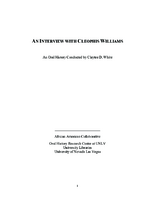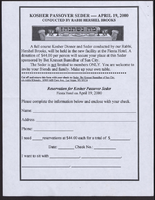Search the Special Collections and Archives Portal
Search Results

Diane Orgill oral history interview: transcript
Date
Archival Collection
Description
Oral history interview with Diane Orgill conducted by Claytee D. White on March 30, 2018 for the Remembering 1 October Oral History Project. In this interview, Diane Orgill, a volunteer with Red Cross, discusses her experience on the night of the October 1, 2017 mass shooting in Las Vegas, Nevada. She speaks of her role as a Red Cross representative at the Emergency Operations Center and the efforts of the Red Cross command center to provide a sense of order in the chaos. She describes some of the support provided to the survivors through the Family Assistance Center and the Disaster Action Team, giving an in-depth explanation of how these sections of the Red Cross function.
Text

Michael Ciccolo oral history interview: transcript
Date
Archival Collection
Description
Oral history with Michael Ciccolo conducted by Claytee D. White on September 18, 2018 for the Remembering 1 October Oral History Project. In this interview, Ciccolo, a doctor at Sunrise Hospital in Las Vegas, Nevada, discusses the early morning after the mass shooting on October 1, 2017. He participated in surgery for two victims in the early morning after the shooting. As a doctor trained in Iowa, Arizona, and California, Ciccolo and his family love the city of Las Vegas. He trained at the University of Iowa, University of Arizona, and University of Southern California. His thoughts after the October 1 tragedy include the belief that as a society, we are not grateful enough for everyday things. He also discusses anger, and his conflicting thoughts on gun ownership.
Text

Lisa Hank oral history interview: transcript
Date
Archival Collection
Description
Oral history interview with Lisa Hank conducted by Barbara Tabach on May 31, 2019 for the Remembering 1 October Oral History Project.
Lisa discusses her move to Las Vegas in the early 1990s from California for a job with the Las Vegas Metropolitan Police Department, and her current position as head of the Police Employee Assistance Program (PEAP). Lisa talks about the night of October 1 and the aftermath of the shooting, both in her work and personal life. She is the wife of Charles Hank III, police officer and another interviewee for the Remembering 1 October Oral History Project.
Subjects discussed include: well-being in aftermath of 1 October; PEAP preparation; healing.
Text

Maria Paloma Galvan oral history interview: transcript
Date
Archival Collection
Description
Oral history interview with Maria Paloma Galvan conducted by Claytee D. White on October 30, 2017 for the Remembering 1 October Oral History Project. In this interview, Galvan discusses the evening of October 1 as a Lyft driver. She recalls hearing gunfire while at the Luxor Hotel and Casino driveway and driving people away from the area. Galvan describes driving a wounded man to Sunrise Hospital and the scene there. Lastly, Galvan discusses the Las Vegas community after the tragedy, and her attitude on gun laws.
Text

Mike Meade interview, February 28, 1977: transcript
Date
Archival Collection
Description
On February 28, 1977, collector Steve Gortz interviewed Mike Meade (b. September 16, 1950 in San Francisco, California) about his life in Nevada. Meade speaks about growing up in Tonopah, Nevada before its decline in population, his move to Elko, Nevada and eventually to the city of Las Vegas. Moreover, he talks about the development of the Strip, the differences between Las Vegas and rural Nevada, as well as the changing environmental landscape. Meade also spends time discussing the controversy surrounding the University of Nevada, Las Vegas (UNLV) dormitory at the time of this interview, the attitude of locals, and his opinion on brothels and prostitution. Lastly, Meade talks about the city’s pollution, the sports and recreation throughout the whole of the state and ends by reading a poem about Nevada from a Bicentennial book.
Text

Transcript of interview with Cleophis Williams by Claytee White, April 27, 2010
Date
Archival Collection
Description
In 1943, Cleophis Hill Williams was a teenager visiting her mother who had moved to Las Vegas. For most of her young life she had lived with her parents in Muskogee, Oklahoma and Paul Spur/Douglas, Arizona. The same year that she visited Las Vegas, she met her future husband Tom Williams, with whom she had nine children, all born and raised on the Westside. Tom worked construction and built their first home on G Street. For Cleophis, she focused her life on raising her children and, whenever possible, finding some precious time to read.
Text

Transcript of interview with Mahamed Youssouf by Barbara Tabach, August 6, 2013 & August 13, 2013
Date
Archival Collection
Description
Ethiopian business owner Mahamed Youssouf became an American citizen in 1986. Born in Harar, Ethiopia, he recalls the hardships he had to endure during the Ethiopia-Somalia conflict. Coming from a family of tailors, he began making clothes with his father at a very early age. Mahamed’s recollections concerning his journey from political refugee to successful businessman demonstrates his resilience and determination to overcome obstacles and achieve his goals. Mahamed moved to Las Vegas, Nevada in 1985, where he rented a storefront in North Las Vegas. The name of his store was Uniform Plus and he focused mainly on making children’s clothes. His efforts proved lucrative as he began buying wholesale in Los Angeles, California, and selling clothes in Las Vegas on the weekends at the outdoor Swap Meet. After a fateful encounter, Mahamed became business partners with Eugene Hoffman, owner of Village East Cleaners. Mahamed firmly believes that communication is the key to socio-economic success. He views education as an investment and states that, “to have dialogue means better relationships.” When the Ethiopian government was overthrown, Mahamed returned home to Africa for a visit. He met his wife while there, got married, and started a family. Mahamed returned to America and bought a family home in Las Vegas. He dedicated his time to teaching his American born children more about Ethiopian culture and taught himself more about American culture— including the African-American experience in Las Vegas, racism, the Moulin Rouge, and the Westside.
Text

Jack Weinstein and Polly Weinstein interview, April 12, 2018: transcript
Date
Archival Collection
Description
Tower of Jewels is one of those iconic Las Vegas businesses that continues to thrive. At the time of this interview, Jack Weinstein is in his nineties and “retired.” With him is his daughter Polly Weinstein, who in addition to being involved in the business management has her own custom designed jewelry line, aptly named The Jeweler’s Daughter. As the youngest of six children born to Jewish Russian immigrants Joseph and Pauline (Polly is named for her grandmother), Jack was raised in a dangerous neighborhood of Detroit, Michigan. His youthful enterprise included collaborating and then splitting up with his brothers in a jewelry business, before eventually moving west to Los Angles in the early 1960s. On his own, Jack became a wholesale salesperson representing lines of watches to other businesses. Included in his list of clients was Al Sanford’s Tower of Jewels in Las Vegas. The two became friends and Al suggested setting up a partnership between Al’s son and Jack in 1964. Eventually
Text

Transcript of interview with Shecky Greene by Barbara Tabach, June 5, 2018
Date
Archival Collection
Description
At the time of this interview, Shecky Greene (1926 - ) is energetically snuggled into his modest Henderson home. His wit and signature sense of humor are at in full swing. Shecky sees a joke in every nook and cranny of a conversation and seamlessly spins the moment with a tune or voice characterization. A native of Chicago, his given name is Fred Sheldon Greenfield. His Jewish parents, Bessie and Carl Greenfield raised Shecky and his older two brothers in a secular but kosher setting. He recalls honing his humor as a child and creating his path to a decades-long career in comedy lounges and in film. His narrative glitters with names of Las Vegas entertainment history. He also talks about his passion for the St. Judes Ranch in Boulder City.
Text

